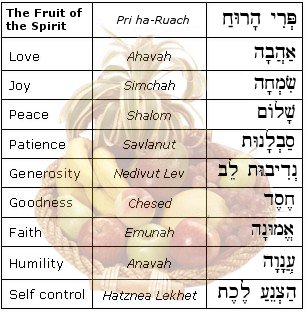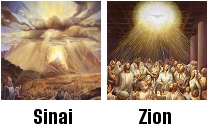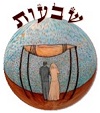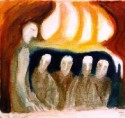|
We are nearing the end of the 49 day "countdown" that runs from the second day of Passover until the holiday of Shavuot ("Weeks" or "Pentecost"). This seven week countdown period is called "Counting the Omer" (ūĪų░ūżų┤ūÖū©ųĘū¬ ūöųĖūóūĢų╣ū×ųČū©) in Jewish tradition (Lev. 23:15-16), and the 49 days between Passover and Shavuot create a growing "chain" that link the two festivals together:

Here are a few reasons why the appointed time of Shavuot is significant for followers of Yeshua (additional reasons are provided on the Shavuot pages):
- Shavuot is regarded as the culmination of the experience of redemption, sometimes called Atzaret Pesach, the "Conclusion of Passover." It is therefore the end (ŽäßĮ│╬╗╬┐Žé) or goal of the redemption experience for believers. Just as the redemption by the blood of the lambs led to Israel's deliverance and the giving of the Torah at Sinai (ūĪų┤ūÖūĀųĘūÖ), so the redemption by the blood of Yeshua led to the world's deliverance and the giving of the Holy Spirit at Zion (ū”ų┤ūÖų╝ūĢų╣ū¤). And just as the covenant at Sinai created the nation of Israel, so the new covenant at Zion created the worldwide people of God, redeemed from "every tribe and tongue" (Rev. 5:9).
The goal of the great Passover redemption was to set us free to become God's own treasured people (ūóųĘūØ ūĪų░ūÆų╗ū£ų╝ųĖūö, am segulah), a light to the nations: ambassadors for Heaven's voice. The outpouring of the Holy Spirit (ū©ūĢų╝ūŚųĘ ūöųĘū¦ų╝ūōųČū®ūü) may therefore be regarded as the climax of redemption, imparting the presence of the Comforter (ŽĆ╬▒ŽüßĮ▒╬║╬╗╬ĘŽä╬┐Žé) to help us live sanctified lives (Acts 1:8).
- Shavuot at Mount Sinai is sometimes considered the day on which "Judaism" was born, remembering the time when the sefer habrit (ūĪųĄūżųČū© ūöųĘūæų╝ų░ū©ų┤ūÖū¬) was sprinkled with blood and ratified by the elders of Israel (Exod. 24:3-11) and the giving of the Ten Commandments to Israel. Shavuot in Jerusalem (i.e., Mount Zion) is the day on which the church was born, remembering the time when the New Covenant of the LORD was ratified by the outpouring of the Holy Spirit upon the followers of Yeshua.
- Agriculturally, Shavuot commemorates the time when the firstfruits (ūæų╝ų┤ūøų╝ūĢų╝ū©ų┤ūÖūØ) were harvested and brought to the Temple, and is known as Chag ha-Bikkurim (the Festival of the Firstfruits). Followers of the Messiah evidence spiritual fruit in their lives as the direct result of the Holy Spirit's regeneration of the heart.
Traditional Judaism identifies various middot ha-lev (qualities of heart) that attend to a genuinely Jewish life. These include Talmud Torah (studying Scripture), ahavat Adonai (loving God), gemilut chasidim (doing works of righteousness), bikkur cholim (visiting the sick), and so on.
The follower of Yeshua likewise must evidence middot hav-lev, though the Source for such comes directly from the power of the Ruach Ha-Kodesh (Holy Spirit) working within the heart of faith. The fruit of the Holy Spirit (ūżū©ūÖ ū©ūĢūŚ ūöū¦ūĢūōū®) listed in Galatians 5:22-23 represent nine visible attributes of a true follower of Yeshua:

Note that these priot (fruits) are not obtained through self-effort or various attempts at human "reformation," but rather are a supernatural outgrowth of the grace and love of God in the life of one who puts their trust in Yeshua as Mashiach. See John 15:1-8. Our lives are sanctified in the manner in which they were initially justified: wholly by faith in the love and grace of God - not by works of our own righteousness (Titus 3:5-6). If we are saved by God's grace through faith, we are likewise sanctified by God's grace through faith...
The tough question we need to ask ourselves is whether our lives genuinely give evidence of the power and agency of the Holy Spirit within us. Strictly speaking, these nine attributes are qualities that only God Himself possesses, since He alone is perfectly loving, perfectly joyful, and so on. But since we are created b'tzelem Elohim (in the image of God) and were given the Holy Spirit to help us resemble our Teacher (Luke 6:40), spiritual fruit should be seen in our own lives (John 14:12; 15:1-8; 26-7). Obtaining such fruit is invariably a matter of faith - trusting that God will help us live our lives in truthful union with Him. (May it please our Heavenly Father to make each of us fruitful l'shem shamayim - for the sake of the Name of our beloved One!)
- Shavuot stands in contrast to Passover that requires unleavened bread (matzah), since the two loaves of bread made from the first fruit of the wheat harvest (shtei ha-lechem) were baked with chametz (yeast) before being "waved before the LORD" (Lev. 23:15-20). There is some uncertainty among Jewish sages regarding the meaning of the use of the otherwise forbidden leaven (Lev. 2:11), though prophetically it pictures the "one new man" (composed of both Jew and Gentile) before the altar of the LORD (Eph. 2:14). The waving of the "two loaves" of leavened bread therefore prophesied the firstfruits creation of the "one new man," both Jew and Gentile, that would "firstfruits" of the Kingdom of God. As Yeshua plainly taught, ultimately there will be one flock, and one Shepherd (John 10:16).
Each of us - and this is especially true and vital for those who belong to Yeshua the Mashiach - are connected to one another as ish-echad chadash (ūÉūÖū®ūüųŠūÉūŚūō ūŚūōū®ūü) "one new man" (Eph. 2:15). Our welfare, blessing, and ultimate salvation is bound up with one another. Just as the midrash says that each soul is linked to a letter of the Torah, so each of us is linked to the LORD Yeshua who gave Himself up for us in order to reconcile us to God. Each child of God is part of the message of Yeshua's life and love in this world.
- At Mount Sinai the Ten Commandments were written on tablets of stone by the "finger of God" (Exod. 31:18), but at Mount Zion, the Torah is written on tables of the heart by the Spirit of God (2 Cor. 3:3; Heb. 8:10). Regarding the prophecy of the New Covenant, it is written: "I will put my law (ū¬ų╝ūĢų╣ū©ųĖūö) in their inward parts, and write it in their hearts" (Jer. 31:33). We are "letters of Messiah, written with the Spirit of the Living God (2 Cor. 3:2-3).

- Just as the Israelites were affirmed as God's chosen people on Shavuot with the giving of the Torah, so the Church was affirmed as God's chosen people at Shavuot after the Mashiach's ascension into heaven (on Mem B'Omer) as the Mediator of a Better Covenant (Heb. 8:6). The 3,000 souls that were added to the church that day were first fruits of the redeemed people of God. Followers of Yeshua are "chosen people" through sanctification of the Holy Spirit and faith in the truth (2 Thess. 2:13). We are chosen to be priests and kings to show forth the praises of Him who called us out of darkness into His marvelous light (1 Pet. 2:9; Rev. 5:10)
- In the Jewish tradition, Shavuot is compared to a wedding, for it was at this time that the covenant between God and the Jewish People was sealed at Mount Sinai (Passover is considered the time of Israel's "betrothal" or engagement to God). The LORD is the Heavenly chatan (groom) who said, "Accept Me"; the Jewish people represent the beloved kallah (bride); and the Torah represents the ketubah (marriage contract). Likewise, the church is called Kallat Mashiach - the Bride of Messiah (Rev. 21:2,9), and we eagerly await the marriage supper to come (Rev. 19:9).

- The Scroll of Ruth (ū×ūÆūÖū£ū¬ ū©ūĢū¬) is read during Shavuot - a beautiful story about God's redemptive love. As the Goel (kinsman-redeemer), Boaz was a wealthy man of the tribe of Judah (Bethlehem) who married a Gentile bride. Boaz's name means "in Him is strength," a picture of the Mashiach Yeshua, his greater Descendant, who also redeemed for himself a bride from among the nations.
We are all in great need for a renewal of the Holy Spirit within our hearts... We are therefore asking the LORD for a renewed experience of His glory and grace during this season.... Shavuot Sameach, chaverim... May you be filled with the Holy Spirit, fruitful in your service, and "clothed with power from on high..."
|





